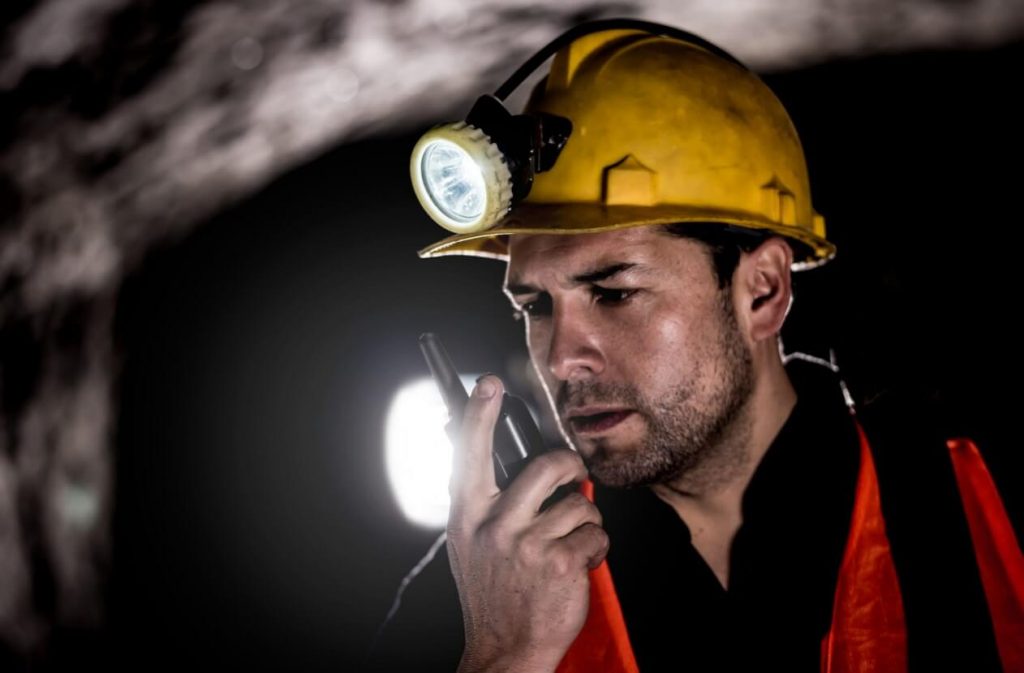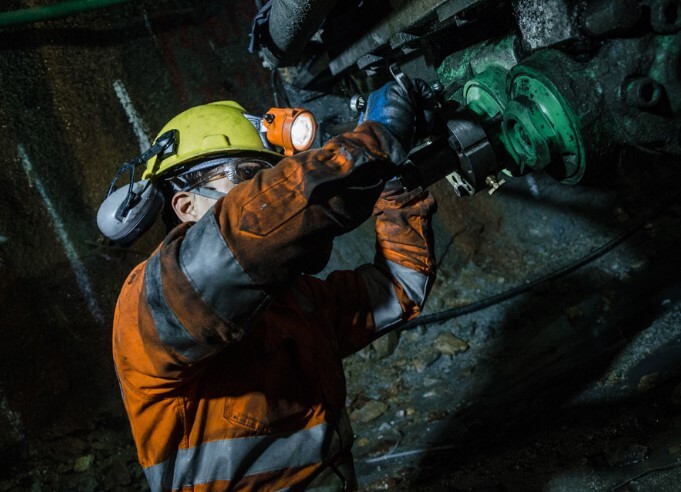Guide to UHF Radios

When you’re on a job site and there are multiple forms of signal interference, such as thick rock or potential radiation, there’s one essential piece of equipment that can prove to be more helpful than a Swiss army knife with a torch and lighter attached – a UHF radio. Also known as CB or Citizens’ Band, UHF radios are versatile communication tools for short-range communications. This guide will introduce you to UHF radios, their legality, usage, and some handy tips for getting the most out of them.
What is a UHF Radio?
A UHF radio is a two-way communication system designed for short-range communications. It operates on frequencies between 476.4250-477.4125MHz, providing 80 radio channels for seamless communication. However, it’s important to note that not all channels can be used freely, as some are designated for specific purposes. Misusing these channels could result in stiff penalties.
Becker Mining USA is proud to offer reliable and efficient UHF radio solutions to help ensure smooth communication during your adventures.
Is it Legal to Use a UHF Radio?
Yes, using a UHF radio is legal, but specific requirements govern its use. You can enjoy UHF radio communication benefits without legal concerns as long as you adhere to these regulations and avoid misusing the designated channels.

GET IN TOUCH
In a hurry? Call us at +1-724-515-4993
How to Use a UHF Radio?
Using a UHF radio is quite simple, although it may take some time to get accustomed to it. The primary thing to remember is that you cannot speak and hear simultaneously. To transmit your message, press the button and speak clearly. During this time, you won’t be able to hear any incoming messages. Release the button to return to the listening mode.
To ensure effective communication, keep your words brief and to the point, and familiarize yourself with common radio vocabulary, such as “over” (indicating you’ve finished speaking) and “Roger” (meaning OK).
Handy Tips for UHF Radio Users
- Choose a suitable channel: Before starting a conversation, ensure you’re on an appropriate channel. Remember that some channels are reserved for specific purposes, so always check before transmitting.
- Maintain radio etiquette: Be respectful and considerate of other users. Avoid using offensive language and refrain from interrupting ongoing conversations.
- Monitor your surroundings: Regularly scan the channels to stay informed about potential hazards, traffic updates, or any relevant information that may affect the environment.
- Use a quality antenna: A high-quality antenna will improve your radio’s reception and transmission capabilities, ensuring better communication.
- Regular maintenance: Keep your UHF radio clean and well-maintained to prolong its lifespan and ensure optimal performance.
UHF Advantages
UHF radios offer several advantages over other forms of communication in job site environments. Their short-range capabilities make them ideal for close-quarters communication, where easer methods like cell phones may have limited signal reception. UHF radios operate on specific frequencies that allow for clear and reliable communication, even in areas with obstacles or signal interference.
One of the key benefits of UHF radios is their versatility. They can be used in various industries and settings, including construction sites, manufacturing plants, event management, security operations, and outdoor adventures. Whether you need to coordinate tasks among team members, communicate instructions to workers, or stay connected during recreational activities, UHF radios provide a practical solution.
When using UHF radios, it’s essential to understand the legal requirements. While UHF radios are generally legal to use, there are regulations in place to ensure responsible and lawful operation. It’s crucial to familiarize yourself with the rules and restrictions associated with UHF radio usage in your region or country. By complying with these regulations, you can enjoy the benefits of UHF radios without any legal concerns.
To operate a UHF radio effectively, it’s important to learn how to use the device properly. Most UHF radios have a push-to-talk (PTT) button that allows you to transmit your message. When you want to speak, press the button and speak clearly into the microphone. Remember that while you’re transmitting, you won’t be able to hear incoming messages. Once you’ve finished speaking, release the button to listen to other users’ responses. This push-to-talk principle ensures that only one person speaks at a time, facilitating orderly communication.
Communication etiquette is another aspect to consider when using UHF radios. It’s important to be respectful and considerate toward other users. Avoid using offensive or inappropriate language and refrain from interrupting ongoing conversations. Wait for a break in communication before transmitting your message to avoid causing disruptions.

GET IN TOUCH
In a hurry? Call us at +1-724-515-4993
Monitoring your surroundings is crucial when using UHF radios. Regularly scan the channels to stay informed about potential hazards, traffic updates, or any relevant information that may affect the environment. By staying attentive to the radio chatter, you can respond promptly to changes in the situation and maintain a safe working or recreational environment.
The choice of the channel is also significant. Before initiating a conversation, make sure you’re using an appropriate channel. Some channels may be reserved for emergency services, specific industries, or government use. Check with local authorities or consult the documentation provided with your UHF radio to identify the suitable channels for your intended purpose.
Investing in a quality antenna is worth considering. The antenna plays a crucial role in the performance of your UHF radio. A high-quality antenna can enhance both the reception and transmission capabilities of the device, resulting in clearer and more reliable communication. When selecting an antenna, look for models that are designed for UHF radios and have good reviews for their performance.
Regular maintenance is essential to keep your UHF radio in optimal condition. Clean the device regularly, paying attention to the microphone, speaker, and any openings or connectors. Use a soft, dry cloth to remove dust and debris. Avoid using harsh chemicals or abrasive materials that may damage the radio. Additionally, check the battery life and replace batteries as needed to ensure uninterrupted operation.
In conclusion, UHF radios are invaluable tools for short-range communication in various industries and recreational settings. By understanding the regulations, mastering the usage techniques, and following proper etiquette, you can make the most of your UHF radio and enjoy seamless communication. Consider investing in high-quality UHF radio solutions, such as those offered by Becker Mining USA, to enhance the efficiency and effectiveness of your job site operations.

GET IN TOUCH
In a hurry? Call us at +1-724-515-4993
Explore Our Range of Products
Unleash the power of crystal-clear communication, allowing you to stay connected with your team, share vital information, and ensure everyone’s safety. With the Guide to UHF Radios by Becker Wholesale Mine Supply, you’ll be equipped with the knowledge to make informed decisions and maximize the potential of your communication devices. Contact us today to learn more!
Remember, when it comes to reliable communication, trust Becker Wholesale Mine Supply—the experts in UHF radios. Get your guide today and experience the difference! Visit the Becker Wholesale Mine Supply website now!
Products That We Offer
- VHF Leaky Feeder System
- UHF Leaky Feeder System
- SMARTSENSE®FIXED MONITOR
- RNG-500VHF Leaky Feeder Cable
- UHF Low Loss Leaky Feeder Cable
- Kenwood NX-203/303 Radios
Take control of your mining communication systems today! With Becker Wholesale Mine Supply, the leading manufacturer in the USA. Contact us now and revolutionize your mining communication systems!